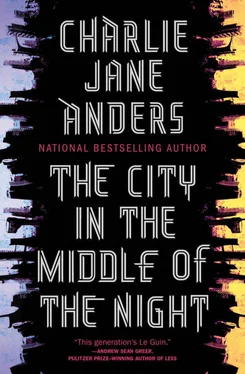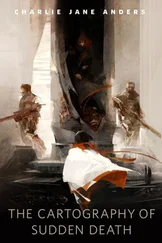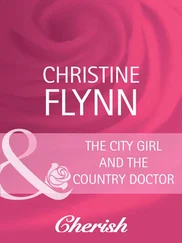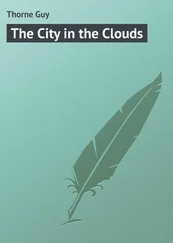The humans beckon me, and I understand most of their chatter. They saw this Gelet holding my throat in her claw, and they thought she was strangling me. As I get closer, three men and one woman step onto the brittle frost, their faces ghostly in their floodlight. The biggest of them holds a harpoon gun that also shines a beam of light from its stock. He aims at the Gelet, who’s too injured to leap to safety.
I throw myself at the man with the harpoon, shouting, “Do not kill” in Argelan. (A moment later, I realize I got the word order wrong, so I was shouting, “Would not have killed.”) I knock the man on his back, and his second harpoon shot goes wild. As he falls, he lashes out and knocks the woman to the ground while the other two men shout. The big man and I roll on the frozen ground, until I bite his hand and smash my forehead into his.
I pull myself free and run back to the city, hoping with every panting lurch forward that I didn’t just get a friend killed.
Budkhi was a small town, about four hundred kilometers south of Argelo, the opposite direction from Xiosphant. A giant bog produced this one kind of moss there that tasted kind of decent if you grilled it, plus the bog-fish were good to eat if you removed their poison sacs first. A lot of people died when they first settled there, but that was true of every place.
The Citizens had passed through Budkhi every once in a while, but most of their visits had ended with them being chased out with axes and slings. What did the people in this swamp-gas village need from a group of odd strangers? The Citizens tried trading, bringing supplies from Argelo or one of the bigger towns to exchange for food and woven swamp-grass, but the Budkhians had a taboo on using anything they hadn’t made themselves. So maybe the Citizens could be a theater troupe instead? Or just offer additional labor, for anything that needed some extra hands? Or they could be teachers? Doctors? Priests? Each time the Citizens arrived, they tried to present themselves as something new and different, and then the Budkhians only doubted them more. Yolanda kept saying, “Every community has a need that it cannot meet in itself. The more they say they do not need us, the harder we must try to become what they need most.”
But the truth was, the Citizens needed the Budkhians much more than the other way around, because this was the only town within a hundred kilometers in either direction, and the food sources in and around that bog were not easy for visiting strangers to harvest. The last time the Citizens tried to visit, the townspeople saw them coming and lit bonfires on the road, with a large shirtless man spinning a lit torch in each hand, as a warning to come no closer.
Still, Budkhi was always the last stop on the way to a big volcano, which was one of the Citizens’ sacred places. So the Citizens skirted around town as best they could, coming perilously close to darkness, and pulled some just-about-edible frog eggs out of the bog on their way out.
Mouth was starting to realize it was odd for a religious order to be so willing to play any role you wanted, in any given situation. Mouth hadn’t spent that much time around other faiths—Alyssa had talked about her Jewish upbringing, and there were a few mosques, two churches, and assorted other houses of worship here in Argelo. But as far as Mouth knew, most people who devoted their lives to a creed wanted everyone to know about it. You only put on different identities for different people if you didn’t care about spreading the good reputation of your teachings.
So Mouth had been trying to break the old habits, and to be the same person with everyone. This was more difficult than you might think, because it turned out, everybody wanted you to be someone else, depending on their needs. A soldier, a friend, an enemy, a reminder of the past. Treating other people with honor was harder than Mouth had ever expected.
* * *
Speaking of, Barney was a whole other person when he was waiting on a table of students—clowning, doing little dance moves, snapping his dirty rag. Mouth watched Barney work, wondering if this really could be a living sage, until Barney noticed and came over. “Mouth, good to see you.” Barney smiled so hard his eyebrows changed shape, but his posture also straightened, and he looked older. “Didn’t know you were coming. What you in the mood for? I have a nut roast that’s pretty similar to the stuff I used to cook on the road.”
Mouth got some straw tea from the table against the far wall, choking just a little on the rank aftertaste. She ate the nut loaf—which did bring back powerful sense memories—and drank two more cups of the bitter tea. The starchy aroma made all the old memories of the Citizens feel more present, and Mouth had caught Barney in a good mood.
He watched her eat with a half-open smile, peppering her with odd reminiscences. “Remember that old blanket Yolanda always wrapped around herself, that was so frayed it looked like scrubgrass? And ugh, those canvas shoes that Cynthia made for everyone, with the spongy soles that started so comfortable and always melted after the first hundred kilometers. Remember those?” Mouth kept nodding while she ate.
She’d started visiting the diner regularly, whenever she wasn’t running errands for the Perfectionists, or helping with Alyssa’s rehab. Sometimes so many students were sitting on every available surface and on top of each other you couldn’t get in. Other times, the diner was closed, with a sign saying that the place would reopen when the university raised its study flag. Argelo was full of things like that: your favorite candy store would open whenever the crosstown train was running, and the crosstown train ran whenever the hydraulic systems were primed, and the hydraulics depended on the water levels in the reservoir, which fluctuated in a more or less predictable fashion. If you knew all these things by heart, you’d be able to get to the candy shop at the right time to buy those peppermints you liked.
But even when Mouth could get into the diner, Barney was often too busy to talk. And if Mouth managed to arrive when the diner was both open and empty, Barney would be intent on cleaning dishes rather than answering Mouth’s questions. “You already know everything,” Barney had said over and over. “Seriously, you got it. You made a life for yourself, didn’t you? You know what you know, and there’s no need to know any more. The Citizens are long gone. Although sometimes I wake up and it feels like I’m in the middle of the camp, and everyone is packing up around me, and it takes me a couple eyeblinks to remember where I am.”
Once in a while, Mouth would catch Barney in a thoughtful mood, and he would muse about everything they had all been through, and all the things the Citizens had tried to do. “We kept to ourselves, you know, but we did try to help people integrate their lives, whenever we could. We would come into these smaller towns as a group of carpenters or plumbers, but after we’d done the work, sometimes people would ask us questions. And we’d try to share some thoughts about how to pay attention, and stop getting distracted by trivial crap. Hang on, I need to check the oven. Where was I? Oh. So we talked, and listened as well. People in those frontier towns see the craziest things.”
“Before Alyssa found you, I thought I had blown my last chance to understand any of it,” Mouth told Barney when the nut roast was gone. “I found a copy of the Invention in a vault in Xiosphant. The only copy, I guess. I just wanted to say the right verses for the dead. A lot of people died, pointlessly, and I didn’t even get the book.”
“Mostly I remember that book being a lot of doggerel,” Barney said. “Their way of keeping everybody from complaining during those long hikes. I mean, don’t get me wrong. If I read it again, maybe it’d speak to me. I do remember there were a few moving passages here and there.”
Читать дальше












